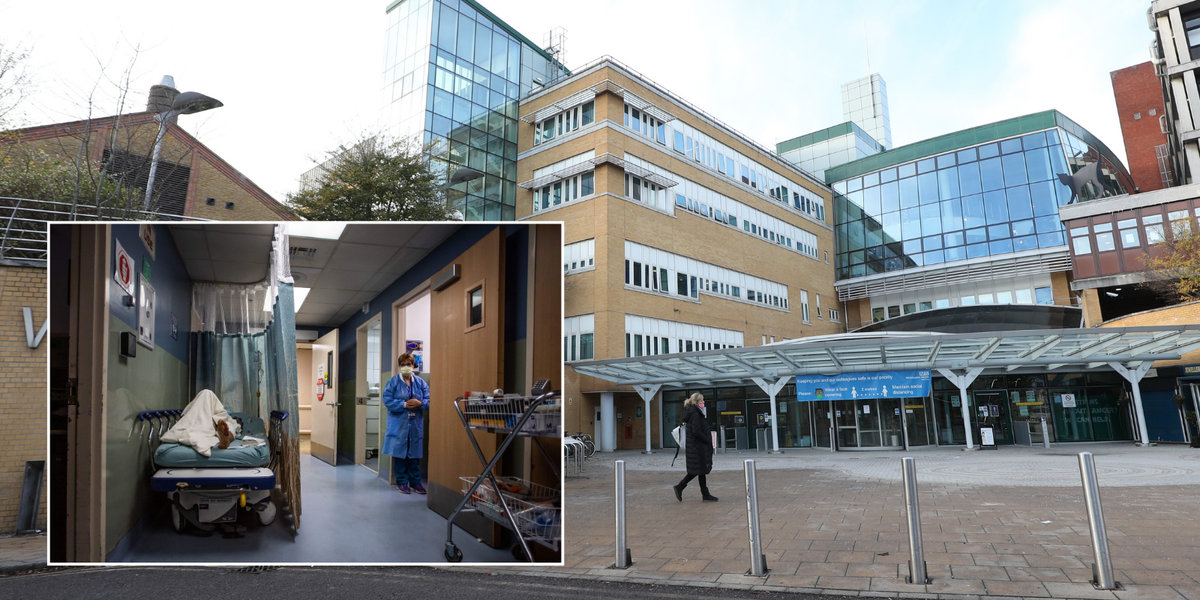A hospital is recruiting nurses to man the corridors where patients have been placed amid an “unprecedented” demand for hospital beds.
Whittington Hospital in Archway, north London, posted multiple adverts looking for temporary “corridor RNs (registered nurses)” who could “alleviate the impact” of overflowing wards amid “skyrocketing” cases of flu.
The nurses would need to work at a band-5 level, which has a base salary of just under £30,000 pro rata.
The adverts come amid a flu-crisis which is battering the NHS, as more than 5,000 hospital beds are now occupied by flu patients.
Whittington Hospital in Archway, north London, posted multiple adverts looking for temporary ‘corridor RNs (registered nurses)’
PA
Doctors and nurses across the country have reported NHS trusts installing sockets and oxygen lines in corridor walls as they brace themselves for an influx of patients this winter.
The north London hospital saw 9,300 patients in its A&E department in December, with more than 3,000 having to wait over four hours to be seen.
A spokesperson for Whittington Health NHS Trust said: “Our hospital has been experiencing very significant pressure in urgent and emergency care. In these circumstances we may have to provide care in corridors, as an absolute last resort.
“In common with other hospitals, where this is necessary, we bring in additional staff on a temporary basis to ensure that care can be delivered as safely and compassionately as possible to patients.
NHS LATEST:
Doctors and nurses across the country have reported NHS trusts installing sockets and oxygen lines in corridor walls as they brace themselves for an influx of patients this winter (hospital in US)
Getty
“We have worked with partners across the health and care system to request mutual aid at times of worst pressures, to alleviate the impact and ensure patients get care as quickly and safely as possible this winter.
“We are grateful to all of our hardworking staff for their commitment during this period of extraordinary pressure, and we apologise to any patient whose care has not met our usual high standards due to the exceptional level of demand.”
One nurse who works in the A&E department, who does not wished to be named, said that patients stationed in the corridor could not ring for help as there were no call bells.
They said the corridors are always full and that it “isn’t safe, you can’t access anyone properly”.
Professor Nicola Ranger, head of the Royal College of Nursing, said that there is “no scenario in which it constitutes good or safe care”.
She told The Sunday Times: “Recruiting tired nurses to do extra shifts solely in corridors is desperate. It shows just how normalised this practice has become.
“What was once an extraordinary escalation measure is now commonplace across our NHS.
A nurse said the corridors are always full and that it ‘isn’t safe, you can’t access anyone properly’
Getty Images
“There is no scenario in which it constitutes good or safe care. It is an affront to patient safety and dignity and we should not be standing for it.”
Dr Adrian Boyle, president of the Royal College of Emergency Medicine, said that corridor care was “completely unacceptable”.
“You cannot provide high-quality, dignified, patient-centred care to people in corridors,” he told the publication. “The sooner we acknowledge it and say this is completely unacceptable the better.”
More than a dozen hospitals have declared critical incidents amid mounting winter pressures, with some patients facing waits of up to two days in overcrowded A&E departments.
A spokesman for Whittington Health NHS Trust said that corridor care was “an absolute last resort” as a result of significant pressure.
“We are grateful to all of our hard-working staff for their commitment during this period of extraordinary pressure, and we apologise to any patient whose care has not met our usual high standards due to the exceptional level of demand.”
An NHS England spokesman said: “The NHS is facing unprecedented demand for services, but we remain clear that caring for patients in temporary spaces is not acceptable and should never be considered as standard.
“All NHS trusts will begin to report a count of the number of patients who receive care within temporary escalation spaces via a new metric in NHS England’s situation reports from January 25.”

